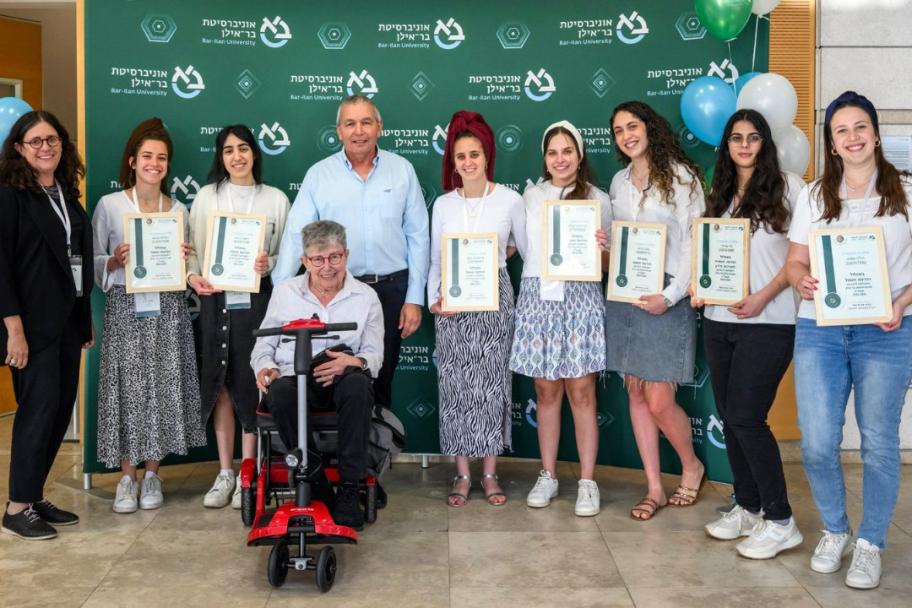The Veronika Zar Excellence Awards Ceremony

The awards are presented annually by Veronika's family in memory of this groundbreaking bridge and construction engineer, with the aim of advancing and empowering young women in technological fields
The Veronika Zar Excellence Awards were presented to outstanding female students in the Faculty of Engineering at Bar-Ilan University who excel both academically and in community service. Veronika, who was a road and bridge engineer, passed away a decade ago. Her family members–daughter Georgie, son Eric, and his wife Zoharit–present these awards annually in her memory, with the goal of advancing and empowering young women in technological fields.
Recipients from the Electrical Engineering program were Hila Mashiach, Ayelet Levi Basin, Roni Nativ, Reut Cohanim, Shaked Badash, and Tehila Kirsch, who also spoke on behalf of the winners. Another recipient was Gal Schneider from the Industrial Engineering and Information Systems program.
Dean of the Faculty, Prof. Orit Shefi, and Faculty Administration Head, Dr. Yossi Talyosef, spoke at the awards ceremony. Faculty member Dr. Tamar Goldzak Mizrachi gave a brief lecture during the ceremony: "Engineering the Future: The Role of Nanomaterials in Advanced Technologies and Sustainability." The ceremony was moderated by Chen Tubi, undergraduate students coordinator.
Veronika Zar, Engineer
Veronika Zar was born in 1927 in Budapest, Hungary, an only child to her parents, who owned a small factory for wood products. An outstanding student, she also practiced the piano, ballet, classical dance, and tennis. In 1943, her father, a member of the Hungarian water polo team, was taken for forced labor by the Germans, never to return. Veronika and her mother survived the Holocaust thanks to the family factory, which was declared an essential facility for the Red Cross.
In 1950, she graduated with honors her civil engineering studies at the Budapest Technical University and became Hungary's first female bridge engineer. She designed bridges for the Hungarian government company and participated in extensive national projects, including planning the reconstruction of the suspended Elizabeth Bridge over the Danube in Hungary, as well as a bridge over the Nile in Helwan, Egypt, as part of an international tender with the Hungarian government's participation.
In 1957, Veronika immigrated to Israel with her mother and two children and set out on a new life in Tel Aviv. While working as a bridge designer at Ma'atz, the National Roads Company of Israel, she pursued a master's degree in engineering at the Technion in Haifa, and in 1974 was certified in structural engineering. She combined a career as a senior engineer with raising a family, at a time when female engineers and single mothers were a rare sight in the local landscape.
Veronika Zar always aspired to professional development and advancement and pursued professional training in engineering and computational fields. In 1967, she was sent to the United States to study computers for bridge design, and in 1975 she was sent to Berlin, Germany, for specialized training in German bridge design methods. After a productive period in the field of bridges on the Be’er Sheva-Dimona railway line, she transitioned to bridge design at Ma'atz and relocated to Jerusalem. She designed grand and complex bridges across the country, namely the Gilo Bridge (Tunnel Bridge), which was the longest and highest bridge in Israel. Even after retiring, Veronika continued to work in the engineering field and advised Standards Institute committees on matters of road design and construction.
Veronika was a lover of culture and languages. She was fluent in Hebrew, Hungarian, German, Latin, French, English, Russian, and Arabic, and left behind a family legacy emphasizing the power of education and higher learning, alongside extensive general knowledge in culture and art.
Last Updated Date : 23/04/2025



